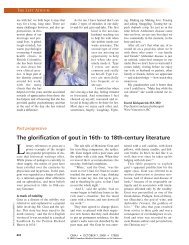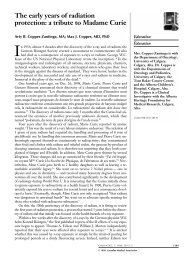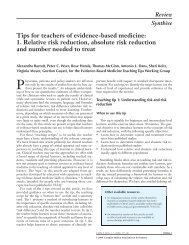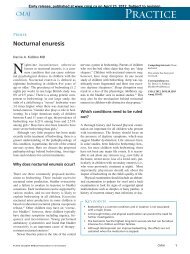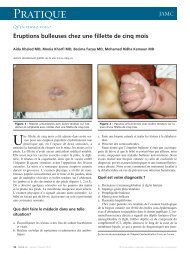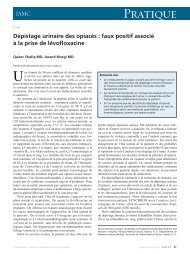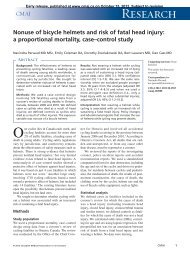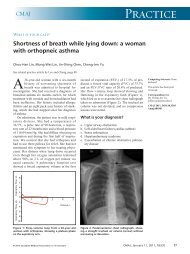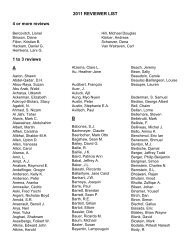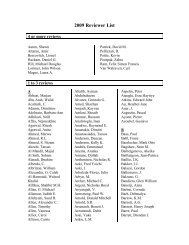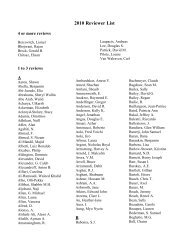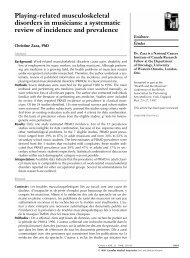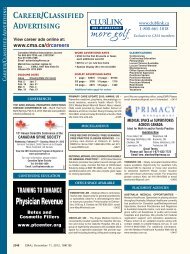Cochlear implants: the head-on collision between medical ...
Cochlear implants: the head-on collision between medical ...
Cochlear implants: the head-on collision between medical ...
You also want an ePaper? Increase the reach of your titles
YUMPU automatically turns print PDFs into web optimized ePapers that Google loves.
Deaf culture<br />
Although Bressler agrees that many adults are satisfied<br />
with <str<strong>on</strong>g>the</str<strong>on</strong>g>ir cochlear <str<strong>on</strong>g>implants</str<strong>on</strong>g>, he asks: “Should we<br />
really experiment <strong>on</strong> deaf children?”<br />
Of particular c<strong>on</strong>cern is <str<strong>on</strong>g>the</str<strong>on</strong>g> inability of a 2-year-old<br />
to provide feedback if an implant is causing problems.<br />
“All opti<strong>on</strong>s must be weighed very<br />
carefully.”<br />
Kristin Snodd<strong>on</strong>, <strong>on</strong>e of Canada’s<br />
first cochlear-implant recipients, recalls<br />
<str<strong>on</strong>g>the</str<strong>on</strong>g> period after she received her<br />
implant in 1990, at age 15, as “<str<strong>on</strong>g>the</str<strong>on</strong>g><br />
darkest period of my life. When my<br />
parents c<strong>on</strong>fr<strong>on</strong>ted me about this<br />
implant . . . I was shocked, because I<br />
did not think <str<strong>on</strong>g>the</str<strong>on</strong>g>re was anything<br />
wr<strong>on</strong>g with me physically, emoti<strong>on</strong>ally<br />
and mentally.”<br />
Despite being a popular straight<br />
A student in a mainstream classroom,<br />
“it was like my parents were<br />
telling me <str<strong>on</strong>g>the</str<strong>on</strong>g>re was something horribly<br />
wr<strong>on</strong>g with me.”<br />
Snodd<strong>on</strong>, deaf from age 5 because<br />
of meningitis, remembered<br />
sound and voices. She was disturbed<br />
that <str<strong>on</strong>g>the</str<strong>on</strong>g> implant was “not like hearing<br />
at all — it was like vibrating in<br />
my skull [and] was very annoying. I<br />
Kristin Snodd<strong>on</strong>: stopped using her implant<br />
have a lot of visual c<strong>on</strong>centrati<strong>on</strong> that keeps me very<br />
alert to my surroundings and <str<strong>on</strong>g>the</str<strong>on</strong>g> implant distracted me<br />
from what I could see.”<br />
Bressler is troubled that o<str<strong>on</strong>g>the</str<strong>on</strong>g>r deaf children may eventually<br />
share Springford’s and Snodd<strong>on</strong>’s reacti<strong>on</strong>s to what<br />
<str<strong>on</strong>g>the</str<strong>on</strong>g>ir parents have d<strong>on</strong>e or suggested. “Deafness is not<br />
something you should make a child feel defective or incomplete<br />
about,” he says. “I w<strong>on</strong>der about <str<strong>on</strong>g>the</str<strong>on</strong>g> future selfesteem<br />
of a child who is aware that she or he has underg<strong>on</strong>e<br />
major surgery for a pros<str<strong>on</strong>g>the</str<strong>on</strong>g>tic device, not to save life<br />
but to please parents.”<br />
Bressler knows that health care professi<strong>on</strong>als and <str<strong>on</strong>g>the</str<strong>on</strong>g><br />
deaf often see <str<strong>on</strong>g>the</str<strong>on</strong>g>se issues much differently.<br />
If a group of hearing physicians,<br />
psychologists, educators, audiologists<br />
and <str<strong>on</strong>g>the</str<strong>on</strong>g>rapists and a similar<br />
group of deaf professi<strong>on</strong>als “each<br />
write textbooks <strong>on</strong> <str<strong>on</strong>g>the</str<strong>on</strong>g> cochlear implant<br />
and its surrounding issues, I<br />
can assure you <str<strong>on</strong>g>the</str<strong>on</strong>g>y will be diametrically<br />
opposed.”<br />
Parents in <str<strong>on</strong>g>the</str<strong>on</strong>g> process of deciding<br />
what is in a child’s best interest will<br />
often be caught in <str<strong>on</strong>g>the</str<strong>on</strong>g> middle of this<br />
“mind-boggling” debate. Bressler,<br />
who frequently c<strong>on</strong>sults parents of<br />
deaf newborns or children, sometimes<br />
receives thick files of detailed<br />
reports from various specialists and<br />
educati<strong>on</strong>al experts.<br />
Even when a 3-year-old has not<br />
yet spoken, “not <strong>on</strong>e reference is<br />
made to <str<strong>on</strong>g>the</str<strong>on</strong>g> possibility of sign language<br />
or any suggesti<strong>on</strong> of meeting<br />
some<strong>on</strong>e in <str<strong>on</strong>g>the</str<strong>on</strong>g> deaf community.” Instead,<br />
<str<strong>on</strong>g>the</str<strong>on</strong>g>re will be a diagnosis of autism, pervasive developmental<br />
disorder “or some o<str<strong>on</strong>g>the</str<strong>on</strong>g>r esoteric diagnosis.<br />
“Parents <str<strong>on</strong>g>the</str<strong>on</strong>g>n tell me <str<strong>on</strong>g>the</str<strong>on</strong>g>y have never been introduced<br />
to <str<strong>on</strong>g>the</str<strong>on</strong>g> c<strong>on</strong>cept of signing and deaf culture,” says Bressler.<br />
“If <str<strong>on</strong>g>the</str<strong>on</strong>g>y are not interested, that’s fine, but at least <str<strong>on</strong>g>the</str<strong>on</strong>g>y<br />
should be told to invest a significant amount of time before<br />
deciding against it. I will support <str<strong>on</strong>g>the</str<strong>on</strong>g>m if <str<strong>on</strong>g>the</str<strong>on</strong>g>y want a<br />
<str<strong>on</strong>g>Cochlear</str<strong>on</strong>g> implant, yes or no?<br />
Deaf family physician Hartley Bressler says several<br />
questi<strong>on</strong>s should be answered before a decisi<strong>on</strong> is<br />
made to proceed with a cochlear implant. The questi<strong>on</strong>s<br />
c<strong>on</strong>cern <str<strong>on</strong>g>the</str<strong>on</strong>g> way a successful implant is defined.<br />
Will a successful implant mean I’ll be able to hear<br />
like hearing people?<br />
Is success <str<strong>on</strong>g>the</str<strong>on</strong>g> ability to communicate like hearing<br />
people, without any obstacles or barriers and without<br />
being dependent <strong>on</strong> assistance?<br />
Is <str<strong>on</strong>g>the</str<strong>on</strong>g> measure of successful language/communicati<strong>on</strong><br />
<str<strong>on</strong>g>the</str<strong>on</strong>g> ability to learn a word at a time after hours of<br />
repetitive rote learning?<br />
Are recipients using <str<strong>on</strong>g>the</str<strong>on</strong>g> implant as an adjunct for lip<br />
reading? (If <str<strong>on</strong>g>the</str<strong>on</strong>g> answer is yes, this cancels questi<strong>on</strong>s 1<br />
and 2.)<br />
Is success measured against <str<strong>on</strong>g>the</str<strong>on</strong>g> academic and educati<strong>on</strong>al<br />
achievements of hearing or deaf people?<br />
Finally, is success based <strong>on</strong> <str<strong>on</strong>g>the</str<strong>on</strong>g> noti<strong>on</strong> that a<br />
cochlear-implant recipient will be able to integrate into<br />
<str<strong>on</strong>g>the</str<strong>on</strong>g> hearing society as <strong>on</strong>e of its better, more successful<br />
and productive members?<br />
If an affirmative answer to <str<strong>on</strong>g>the</str<strong>on</strong>g> final questi<strong>on</strong> is used<br />
to define success, says Bressler, it means that “all <str<strong>on</strong>g>the</str<strong>on</strong>g><br />
successful deaf physicians, lawyers, PhDs and o<str<strong>on</strong>g>the</str<strong>on</strong>g>r<br />
professi<strong>on</strong>als in <str<strong>on</strong>g>the</str<strong>on</strong>g> world” have been discounted.<br />
CAN MED ASSOC J • OCT. 1, 1997; 157 (7) 931



